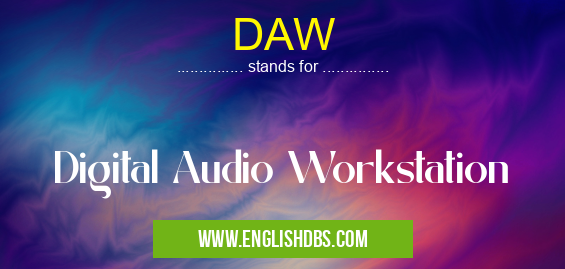What does DAW mean in NETWORKING
A Digital Audio Workstation (DAW) is a tool used by music producers, audio engineers and other sound professionals to record, mix, edit and master audio. It is an integrated digital audio production software platform that contains applications for recording, sequencing, mixing, effects processing and mastering of audio. DAWs are used to create professional-quality recordings in the studio and for live performances.

DAW meaning in Networking in Computing
DAW mostly used in an acronym Networking in Category Computing that means Digital Audio Workstation
Shorthand: DAW,
Full Form: Digital Audio Workstation
For more information of "Digital Audio Workstation", see the section below.
» Computing » Networking
Essential Questions and Answers on Digital Audio Workstation in "COMPUTING»NETWORKING"
What is a Digital Audio Workstation?
A Digital Audio Workstation (DAW) is a tool used by music producers, audio engineers and other sound professionals to record, mix, edit and master audio.
What can be done with a DAW?
With a DAW you can record live performances or compose tracks from scratch with virtual instruments or sample banks. You can also edit existing recordings using editing tools such as pitch correction and time stretching plugins. Additionally you can mix your tracks using effects such as compression, EQ and reverb plugins to achieve the desired soundscape in your productions.
Is there a difference between hardware and software DAWs?
Yes, there are hardware DAWs which use specialized hardware components such as mixing boards to control parameters of the recording process while software DAWs are programs that run on computers instead of dedicated hardware components.
What software do you need to operate a DAW?
Generally speaking you will need an operating system capable of running the necessary software for your particular type of DAW (such as Pro Tools or Logic). Additionally depending on the features of the specific DAW you may need additional VST plugins or sample libraries for complete functionality or creating additional sounds.
Who uses Digital Audio Workstations?
Music producers, sound engineers and post-production personnel use Digital Audio Workstations for creating commercial releases or film scores in both virtual/software environments or professional recording studios. Additionally many bedroom/hobbyist musicians have access to these same tools at home due to advancements in technology over the recent decades allowing them to create amateur recordings without needing access to expensive studio facilities.
Final Words:
The advent of the digital age has made it easier than ever before for anyone with access to a computer system to produce professional sounding music using reliable tools like those found within Digital Audo Workstations (DAWs). With more people having access than ever before these tools continue developing new features every year allowing users greater flexibility when it comes designing their own unique productions.
DAW also stands for: |
|
| All stands for DAW |
